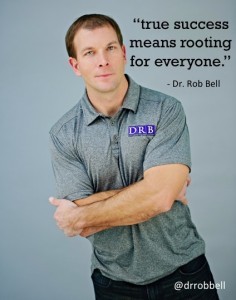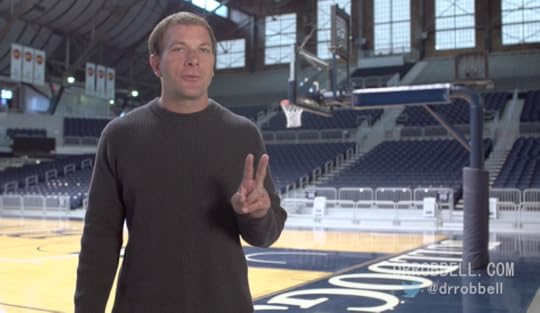Rob Bell's Blog, page 28
July 25, 2015
End practice early?
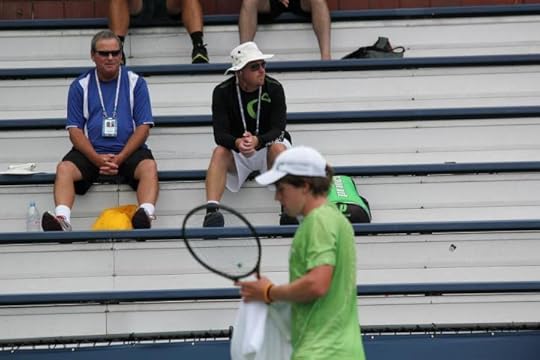
There are not many secrets to success. However, one secret that I think holds true is the ability of one more. When we are tired and fatigued, the key is to be able to endure just one more. One more rep, writing one more page, one more sales phone call. Just one more builds mental toughness. Often, it is effective. Yet, there is a prerequisite to implementing this strategy and that is we first must have the passion and will to do “one more.”
As parents and kids, we have heard and announced this just “one more” technique. We push, just a little bit, (some unfortunately, a lot) for our son or daughter to give more effort. Add up the number of practices and seasons of one more and that is a lot of externally driven passion in the form of nagging, or strong-arming our son or daughter into practice.
Hall of Fame tennis coach Jeff Smith, used a different technique to help build the passion in his son Bryan Smith. He would end practice early… He would first tell Bryan how long they were going to hit tennis balls on the court. The time would vary to 30 minutes, 45 minutes, or an hour. So, if they were going to hit for 45 minutes, after 20 or 25 minutes, he would end practice and tell Bryan they were ending.
Bryan, having fun, didn’t want to end early. He would ask his dad to continue and the seed of passion was slowly built without the nagging, pleading, or coercion of one more.
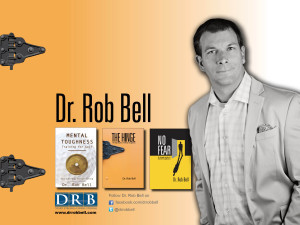 Dr. Rob Bell is a Sport Psychology coach. DRB & Associates based in Indianapolis works with professional athletes & corporate athletes, coaches, and teams building their Mental Toughness. His 2nd book is titled The Hinge:: The Importance of Mental Toughness
Dr. Rob Bell is a Sport Psychology coach. DRB & Associates based in Indianapolis works with professional athletes & corporate athletes, coaches, and teams building their Mental Toughness. His 2nd book is titled The Hinge:: The Importance of Mental Toughness
 Follow on twitter @drrobbell or contact drrobbell@drrobbell.com
Follow on twitter @drrobbell or contact drrobbell@drrobbell.com
Check out the new film & e-book, NO FEAR: A simple guide to mental toughness .
July 17, 2015
Winners, Losers, & At-Leasters
 Excerpt from my next book: Don’t “Should” on your kid. Released Fall 2015.
Excerpt from my next book: Don’t “Should” on your kid. Released Fall 2015.
Wade was a very talented 12-year-old hockey player, but he was a coach’s nightmare. He would only play hard when he felt like it, which was, unfortunately, only about a quarter of the time.
Not surprisingly, Wade’s father also worked whenever he felt like it. He had Dilbert comic strips up in his office and often bragged about how little he worked.
Children will become in many ways what their parents are, and we shape their belief systems. However, parents cannot give away what we don’t possess ourselves.
There are three types of people: winners, losers, and at-leasters.
These are not only three types of people, but actually three distinct beliefs that we form as children. They shape who we eventually become.
Winners and losers make up a very small percentage of the population. For example, when anyone discusses athletes in life, no one really talks about the twentieth or fortieth best athlete in that sport. They reference just a select few, the very best, the top .1 percent. Tiger Woods, Tom Brady, Peyton Manning, Lebron James, Missy Franklin, etc. They are referencing winners, athletic geniuses blessed to excel. These people will be successful in any situation.
Losers, on the other hand, are born from a combination of poor circumstances and choices and a belief that everything turns out bad for them. These are the victims in life. It never is about them; it’s someone else’s fault. Again, a very small percentage of the population.
Most, however, are the at-leasters. At-leasters are not losers—far from it. They are involved, active, and in it. But, they lack the ingredients at becoming winners. They believe that “at-least” we showed up, “at-least” we weren’t last, “at-least” we weren’t as bad as them. It’s a defense mechanism that protects them from the pain of not being winners. It is a struggle for at-leasters to get out of their comfort zones. We have all been there, but we don’t have to live there.
At-leasters go through the motions. Settling is okay. Playing it safe was good enough. Our comfort zone was comfortable. We would rather be a “maybe” than a “no.” Be good, but just not too good. If I was really good one day, I’ll just say, “Yeah, but I’m not that good.
The “at-least” mentality is toxic and systemic. The environment of youth sport has perpetuated at-leasters.
Youth sport that gives everyone a trophy has created an at-least mentality. At least we got a trophy… We don’t create winners by making everyone NOT losers.
However, youth sport often stresses winning so much over development that it has also created a culture of at-leasters. The short-term is magnified and the long-term is miniaturized. The long-term is looked at through a telescope and the short-term through a microscope.
No one wants to lose, but when we only emphasize winning over development, it causes us to self-protect. One way or another, “at least we weren’t last” creeps into our mentality. We rarely create winners or mental toughness by only treasuring winning.
Athletes today have become perfectionists and safe. They will do everything they can to please coaches and parents. Athletes learn that in order to please coach and parents is to just not lose.
It’s hard to be driven when you are being driven. We can also inadvertently drive a child into the at-least mentality. It’s not about you—it’s about them. We can’t make it about us, and it cannot become about us. We fail when and if it does. The best sport parents seem to be behind the scenes, providing encouragement and a supportive environment. Dr. Rob Bell is a Sport Psychology coach. DRB & Associates based in Indianapolis works with professional athletes & corporate athletes, coaches, and teams building their Mental Toughness. His 2nd book is titled The Hinge: The Importance of Mental Toughness
Dr. Rob Bell is a Sport Psychology coach. DRB & Associates based in Indianapolis works with professional athletes & corporate athletes, coaches, and teams building their Mental Toughness. His 2nd book is titled The Hinge: The Importance of Mental Toughness  Follow on twitter @drrobbell or contact drrobbell@drrobbell.com
Follow on twitter @drrobbell or contact drrobbell@drrobbell.com
Check out the new film & e-book, NO FEAR: A simple guide to mental toughness .
July 10, 2015
Parenting is Contagious

When it comes to parenting, your example isn’t the main thing, it’s the only thing. As a professional speaker and author who studies and writes about what the best do better than the rest, I was blown away by what was possibly the most amazing audience I’ve ever spoken to.
I recently spoke at the Collegiate Strength & Conditioning Coaches Association annual convention. Those folks are leadership personified. The biggest, fastest, strongest, healthiest group of people you’ll ever meet.
What they do in their daily work with the people they lead (college athletes) applies to each and every one of us in the work we do leading our children at home and our employees in the workplace. As I thought about the phenomenal impression they all made on me it got me thinking about precisely what leadership is at its core. Even more so, it made me take a long hard look in the mirror.
You’ve probably hear the expression he or she “just gets it”. Well, when it comes to leadership these coaches ALL “get it”. I didn’t see any negative, lazy, disengaged, unhappy, overweight or unhealthy looking people sitting in that audience anywhere. ZERO… not a single one. I also didn’t see them drinking at the bar late into the night which is a common occurrence at most conventions. These folks were the epitome of high performance. They didn’t live vicariously through the success of their athletes either. They were too busy creating their own success. They were the epitome of mental toughness and simply walked their talk.
The entire experience was a great reminder that when it comes to parenting, your example isn’t the main thing, it’s the only thing. Think about it… How do these coaches convince world-class athletes they are capable of being bigger, faster and stronger? Quite simply they do it by being bigger, faster and stronger themselves.
“Our lives are a mirror, what we give out gets reflected back to us by others.”
Whatever you’re doing is contagious. We are all living proof of that statement. I know from experience:
Balance is contagious. I found that when I wasn’t modeling balance for my team, they weren’t balanced.
Negativity is contagious. When I criticized the officials, my players did.
Conversely, when they were nervous during a big game or a key timeout, if I was calm their nerves would settle and they’d become calm. Calm is contagious.
Think again before criticizing your child, their coach, or the officials. Bite your tongue instead of yelling at your child to run faster or work harder. Besides, yelling is a poor excuse for coaching and for parenting.
I recently had an executive coaching client complain to me that most of his employees were “negative and low effort” (his words not mine). I encouraged him to stop keeping “banker’s hours” and be more positive and kind to them. Which, to his credit he did, it’s no small surprise that they just posted their best quarter since 2006.
We need to be the change we wish to see in others. Kids need a model to see not just a motto to say. They crave authenticity and can sniff out B.S. a mile away. Their B.S. meter is calibrated with even more sensitivity and is more accurate than the adults you lead.
I share this with you because being at the CSCCa convention was an important reminder that I need to heed this advice as much as anyone. I have a 9 year old who is ADHD. If I want her to be less impulsive and more mindful, I need to practice mindfulness and emulate it better for her. I also have an 11 year old child who is entering a very emotional stage and prone to drama and outbursts. If I want her to be calm and patient, guess what I have to get better at.
About John Brubaker | Performance Consultant
John is the author of two award-winning books: John Brubaker is a nationally renowned performance consultant, speaker and award-winning author. More importantly he’s a husband and a father. John teaches audiences how to obtain better results in business with straightforward tools that turbo charge performance. Using a multidisciplinary approach, “Coach Bru” helps organizations and individuals develop their competitive edge.
John Brubaker is a nationally renowned performance consultant, speaker and award-winning author. More importantly he’s a husband and a father. John teaches audiences how to obtain better results in business with straightforward tools that turbo charge performance. Using a multidisciplinary approach, “Coach Bru” helps organizations and individuals develop their competitive edge.
(VIDEO) The art of the follow-through…
James Altucher’s podcast and book stated the three types of business that SELL themselves. If you can help others out with one of these three issues, you’ll be rich.
We need mental toughness in order to achieve our goals, and my fun 4-minute talk was given on the mental skill needed to accomplish one of these…
Check out the awesome SPARKS Talks here…
 Dr. Rob Bell is a Sport Psychology coach. DRB & Associates based in Indianapolis works with professional athletes & corporate athletes, coaches, and teams building their Mental Toughness. His 2nd book is titled The Hinge: The Importance of Mental Toughness
Dr. Rob Bell is a Sport Psychology coach. DRB & Associates based in Indianapolis works with professional athletes & corporate athletes, coaches, and teams building their Mental Toughness. His 2nd book is titled The Hinge: The Importance of Mental Toughness  Follow on twitter @drrobbell or contact drrobbell@drrobbell.com
Follow on twitter @drrobbell or contact drrobbell@drrobbell.com
Check out the new film & e-book, NO FEAR: A simple guide to mental toughness .
July 3, 2015
11 ways to get out of our comfort zone
 I’ve ran two marathons and I put everything I had into both. My best time was a respectable 3:21 and that was running six days & fifty miles a week with speed work. I kept track of every run and reviewed it the other day; it was intense.
I’ve ran two marathons and I put everything I had into both. My best time was a respectable 3:21 and that was running six days & fifty miles a week with speed work. I kept track of every run and reviewed it the other day; it was intense.
We get nowhere until we get out of our comfort zone. Mental Toughness is not just physical. Most relate mental toughness to physical tasks because we can measure it and it is indeed difficult. However, we all can improve our mental toughness. We just need to get uncomfortable.
I’m writing my 4th book on mental toughness, specifically for parents. I write every single morning for 1-2 hours. It is uncomfortable and some days are worse than others. But, my belief is that they don’t give bestsellers away.
1. Want to vs. have to…
If we are not doing what we love to do, what’s the point? Not many people get better at things they don’t enjoy. Our mental toughness is aligned with our passion, perspective, and gratitude. If we dwell on the things that we don’t have, we are operating from a viewpoint of scarcity instead of abundance. Remember, we focus on negatives in the darkroom.
2. Start with the hardest…
One of the PGA Tour players that I worked with taught me tons about mental toughness. Before Scot Stallings won his 1st PGA Tour victory, we were at an event that changed the way I approach life. He had to complete a putting drill in order to leave the course. There was one putt that was unreal and I figured he would save the toughest putt for last. He pointed at the Rasputin of holes and said,“ I’m starting with that one!”
Tracy Thorsell is in her last year at the Naval Academy. She will graduate with a degree in electrical engineering and speaks five languages. She took Chinese in High-school because it was the toughest.
Too often we start with and only want the easy tasks. Get uncomfortable and build our mental toughness by starting with the hardest task. We’ll get confidence and get momentum from accomplishing the most difficult first.
3. Sit in a different seat & go a different route…
When I was a University professor, I had no seating arrangements, but people sat in the same seat every time. We seek comfort and we are creatures of habit. That is why we congregate around the same area and drive the same route. Go a different way is a simple way to engage the mind and get out of our comfort zone.
4. Be Honest…
I was once asked if I had seen a certain movie. I actually lied that I had because I wanted to be in on the conversation. Honesty with others is tough, but honesty with ourselves is way more difficult. Changing for the better is a good thing, however it requires honest self-assessment. Not many people can be honest, because it makes them vulnerable.
5. Connect w/ others…
Mushrooms and negatives grow in the dark. It takes little mental toughness to isolate. But, our condition changes with the books we read and the people we meet and interact with. Get out of the comfort zone by meeting one new person a day.
6. Suit up & show up…
A boxing coach, Jason Minnick, told me that the boxers who are mentally tough are the one’s that show up… after a beating. The toughest part is indeed showing up. Too often we allow one mess up or mistake to define us. It doesn’t matter how bad we messed up, learn from it, and get back on the path.
7. Don’t complain…
John Wooden said, “Don’t complain, whine or make excuses, your friends won’t need them and your foes won’t believe you.” Life without complaint means responding to situations and people, not reacting.
8. Face the fear & do it anyways…
I wrote NO FEAR: A simple guide to mental toughness because FEAR is the biggest thing keeping us from our goals. Everything we want in life is on the other side of that fear. The story that we tell ourselves either lifts us up or tears us down. Everyone is afraid, but few address it. Get out of the comfort zone and just do it, whatever your “it” is.
because FEAR is the biggest thing keeping us from our goals. Everything we want in life is on the other side of that fear. The story that we tell ourselves either lifts us up or tears us down. Everyone is afraid, but few address it. Get out of the comfort zone and just do it, whatever your “it” is.
9. Trust others…
My friend Keith Tyner took his family on an R.V. trip out west. For every person he encountered and had a conversation, he simply gave them a little book reading light. Do you know how many people struggled with taking that small gift?
I hate trusting others, because it means I’ll may hurt. I hate asking for help because it means I’m stupid. That’s the story I tell myself that brings me down. The better story is I need to trust others because we can help each other. The odd thing is that no one wants to ask for help, but everyone wants to give it.
10. Pray & pray again…
Get uncomfortable by surrendering the things we cannot control. If prayer doesn’t’ work the first time, then pray again.
11. Trust your gut…
Our gut is our in-born smoke detector. It’s our GPS. However, it’s a tough choice whether we listen to it or not. I am convinced we are right more often than not when we trust our gut. However, we will still be wrong on occasion, we just can’t let our mistakes to dictate how we operate. When we trust our gut, it simply reflects that we are confident.
 Dr. Rob Bell is a Sport Psychology coach. DRB & Associates based in Indianapolis works with professional athletes & corporate athletes, coaches, and teams building their Mental Toughness. His 2nd book is titled The Hinge: The Importance of Mental Toughness
Dr. Rob Bell is a Sport Psychology coach. DRB & Associates based in Indianapolis works with professional athletes & corporate athletes, coaches, and teams building their Mental Toughness. His 2nd book is titled The Hinge: The Importance of Mental Toughness  Follow on twitter @drrobbell or contact drrobbell@drrobbell.com
Follow on twitter @drrobbell or contact drrobbell@drrobbell.com
Check out the new film & e-book, NO FEAR: A simple guide to mental toughness .
June 19, 2015
James Altucher’s Top 11 Podcasts
I don’t listen to podcasts. That’s how good these are. James is the reason why I try to write down ten ideas everyday, and a small reason why I stopped drinking. I could go on & on. But, here is his latest book which is a must read.

His podcast has hit the 1 year anniversary and I guarantee your mental toughness will increase dramatically if you listen to every episode, there’s over 116… How bad do you want new evidence to change your belief system? If not, I’ve selected the top…
Here are the Filet Mignon of the podcasts:
1) Ep 100: Secrets of the millionaire mind- T. Harv Eker: If you don’t work on your thinking, you’ll still get the same results… Plus, you should be a millionaire if you’re over 30 years old…
2) Ep 90: Success in the face in obstacles: – Jack Canfield: Author of Chicken Soup for the Soul. Want to write a successful book? Check this one out…
3) Ep 62: Money is just a game: – Tony Robbins: A great interview about money and our attitudes toward it. Is a 401k your best investment?
4) Ep: 113: Go do you:- Neil Strauss: It’s cool because I’ve never heard an interview where it was switched between interviewer & interviewee…
5) Ep 108: Shares his keys to success:- Ryan Holiday: I love hearing about Hinge Moments and he’s got a really good one! I love rooting for guys like this. Would love to have this guy promote my next book.
6)Ep 67: Stealth success: -Mitch Lowe: Co-owner of NetFlix had classic Hinge moment and Blockbuster later would become obsolete…
7) Ep 73: Are you a Giving, Taker, or a Matcher- Adam Grant: This episode is really cool, but it stung at the same time. It made me take a look inside. Honestly, one of the reasons I did this post is because I want James to read one of my books.
8) Ep 53: Six secrets to achieving happiness & success. - Ted Leonsis: He was on the Jim Rome Show back in 2000 and was the reason why I wrote 100 things I wanted to do before I died.
9) Ep 42: Entrepreneur’s paradise: -Coolio: This was the 1st episode I listened to, because I LOVED Fantastic Voyage growing up. The path, strength, and insight that Coolio displayed was un-real.
10) Ep 114: How to get paid doing what you love. - Matt Barrie of Freelance.com- A super-worthy tale of how this website got started and the journey that Matt took.
11) Ep 115: How to mange your employees when they all carry guns.- Rick Ross- This was America’s most successful drug dealer. At his peak, he made 1 million dollars a day. He didn’t ever buy anything either, he invested back with individuals…
 Dr. Rob Bell is a Sport Psychology coach. DRB & Associates based in Indianapolis works with professional athletes & corporate athletes, coaches, and teams building their Mental Toughness. His 2nd book is titled The Hinge: The Importance of Mental Toughness Follow on twitter @drrobbell or contact drrobbell@drrobbell.com
Dr. Rob Bell is a Sport Psychology coach. DRB & Associates based in Indianapolis works with professional athletes & corporate athletes, coaches, and teams building their Mental Toughness. His 2nd book is titled The Hinge: The Importance of Mental Toughness Follow on twitter @drrobbell or contact drrobbell@drrobbell.com
Check out the new film & e-book, NO FEAR: A simple guide to mental toughness .
June 12, 2015
True success
Duke basketball fans have one of the most indelible student sections in all of sports: The Cameron Crazies. They epitomize passion, organization, and wittiness. They camp out in Krzyzewskiville for three months prior to games, they hand out cheat sheets for the student cheers, and were the one’s that coined the now famous “air-ball” chant.
Can you imagine that the Cameron crazies once actually cheered for an opposing player?
During one game in 1995, Joe Smith of the Maryland Terrapins was unstoppable. He scored 40 points, had 18 rebounds, and had a tip-in basket as time expired to beat Duke, 94-92.
At the end of the game, after they lost, they truly applauded Joe Smith!
True success is being able to root for everyone.
However, we often feel threatened by others having success, because somehow it means that we can’t be successful too. Inter-team conflicts are based on the belief that success is limited. Therefore, we operate on the actions that not only do I need to be the best that I can be, but remove any obstacle in that path, including anyone vying for my position or record.
We perpetuate this notion and create a culture of it. Whenever we call out someone, put down a coach, or another company, we are doing so based out of fear. I hate it when I notice that I’m rooting against someone or envious of other’s success. It’s just based out of a fear that I won’t reach my own goals.
When we root for others, it means that we are confident. It shows that we are secure enough to actually wish the best for others. That is true success!
When I post this philosophy online, I’ll get questions like ‘even the Yankees?” It doesn’t mean that we have to cheer or root for our direct competition. It just means that we should look for opportunities to cooperate, cross-promote, and learn from them.
Rooting for everyone also means wanting to beat people at their best. I hate it when people make excuses for losing, because it tries to take away the winners success. We should want them to play well, but just for us to perform a little bit better. It doesn’t take away from our own drive or hating to lose.
We actually need others to succeed so we know what we have to do in order to improve. A funny thing happens when others around us have success. It cements the belief in ourselves that it is possible to reach the next level. If everyone around us was mediocre, what models do we have to get better?
 Dr. Rob Bell is a Sport Psychology coach. DRB & Associates based in Indianapolis works with professional athletes & corporate athletes, coaches, and teams building their Mental Toughness. His 2nd book is titled The Hinge: The Importance of Mental Toughness
Dr. Rob Bell is a Sport Psychology coach. DRB & Associates based in Indianapolis works with professional athletes & corporate athletes, coaches, and teams building their Mental Toughness. His 2nd book is titled The Hinge: The Importance of Mental Toughness Follow on twitter
@drrobbell
or contact
drrobbell@drrobbell.com
Follow on twitter
@drrobbell
or contact
drrobbell@drrobbell.com
Check out the new film & e-book, NO FEAR: A simple guide to mental toughness .
May 22, 2015
30 seconds to Mental Toughness
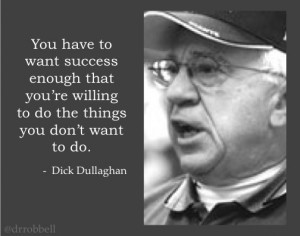 Playing baseball in high school, all I wanted for Christmas was to go to a baseball camp in Sarasota Florida. As a pitcher, we learned these strengthening exercises that are now the norm. The Major League instructor told us all that when we returned home, we wouldn’t do these exercises. I balked at the notion, bought the five lb weights and performed these rotational movements. He was correct however, this lasted just a few weeks…
Playing baseball in high school, all I wanted for Christmas was to go to a baseball camp in Sarasota Florida. As a pitcher, we learned these strengthening exercises that are now the norm. The Major League instructor told us all that when we returned home, we wouldn’t do these exercises. I balked at the notion, bought the five lb weights and performed these rotational movements. He was correct however, this lasted just a few weeks…
Mental Toughness is often difficult to evaluate because it involves our response to difficult and/or stressful situations. Mental toughness means doing those things that we simply don’t want to do, getting out of our comfort zone, and taking care of the little things that it takes to be a champion.
Most of you will dismiss this exercise, won’t see any value, and scoff at the notion that 30-seconds can build your mental toughness. Here it is:
At the end of your shower, turn the water on cold for 30 seconds….
We must not fear 30-seconds of a cold shower. If you do a tough mudder, it’ll be much worse. It’s like doing the ice-bucket challenge, but in your shower and for longer, and no-one will film it. The 30-seconds is no different than pushing yourself in a race or workout, or having a pressure situation in a game. You have to push through it and focus. More importantly, you must recognize the type of thoughts that arise and how to control these thoughts.
What’s amazing though is the fear and apprehension to the build up. Trust me, you will not die! Yes, it will be uncomfortable, most likely take your breath away, and involve some physical reactions to the cold water.
The cold water causes you to narrow your focus and it’ll be near impossible to distract yourself from the sensation. You’ll notice immediately what your thoughts attend to and you’ll instantly develop a strategy.
You can count to thirty, sing yourself, spin around, or tell yourself motivating statements.
Either way, you’ll find very quickly what type of thoughts enter your mind and what you do with them. At the end, bask in the thought that you just did what most aren’t willing to do. Carry that motivation into your day.
Of course, you can refuse this 30-second test, no-one will know… except for you.
“Do something everyday for no other reason than you would rather not do it, so that when the hour of dire need draws nigh, it may find you not unnerved and untrained to stand the test.”-William James
 Dr. Rob Bell is a Sport Psychology coach. DRB & Associates based in Indianapolis works with professional athletes & corporate athletes, coaches, and teams building their Mental Toughness. His 2nd book is titled
The Hinge: The Importance of Mental Toughness
. Follow on twitter
@drrobbell
or contact
drrobbell@drrobbell.com
Dr. Rob Bell is a Sport Psychology coach. DRB & Associates based in Indianapolis works with professional athletes & corporate athletes, coaches, and teams building their Mental Toughness. His 2nd book is titled
The Hinge: The Importance of Mental Toughness
. Follow on twitter
@drrobbell
or contact
drrobbell@drrobbell.com
Check out the new film & e-book, NO FEAR: A simple guide to mental toughness .
May 15, 2015
4 reasons to save the Endangered Athlete…
 The Bison once roamed North America and met the needs of an entire population of indigenous people. However, The bison merely became a creature for it’s hide and almost became extinct. Once as many as 60 million bison roamed and was limited down to only 300 total in 1900. Thankfully, the numbers have returned to over 400,000.
The Bison once roamed North America and met the needs of an entire population of indigenous people. However, The bison merely became a creature for it’s hide and almost became extinct. Once as many as 60 million bison roamed and was limited down to only 300 total in 1900. Thankfully, the numbers have returned to over 400,000.
The multi-sport athlete is becoming extinct. It was once revered for the many benefits multiple sports provided; fun, teamwork, creativity, self-governing, motivation, fitness, and confidence. However, lost somewhere between adolescence and puberty is the specialist, an athlete whose sole purpose is to try and excel at one sport. Seek, Kill, & Destroy.
The difference however between the bison and the multi-sport athlete is that humans could never domesticate the American Buffalo. It was just too powerful. We have been able to contain the multi-sport athlete though. The specialist, and his or parents, live under the guise that if you play different sports; then “you’ll fall behind” or “you’ll get hurt.”
The latter “you’ll get hurt” is a major misnomer that has been shown to have the opposite effect. Athletes that specialize have a greater rate of injury compared to non-specialized athletes.
“You’ll get left out” is the true bison in the room.
Here’s 4 reasons to play multi-sports…
1) The sport skills transfer!
87% of the draft picks in the 2015 NFL draft were multi-sport athletes. This isn’t a one-year anomaly either. The average hovers around 70%. All athletic movements transfer! Quickness, running, jumping, agility, throwing, etc. all transfer. For instance, jumping for a basketball is similar and builds the same muscles need to push off the blocks in swimming and have a good kick.
2) Multi-sport athletes have a higher sport I.Q.
They develop a feel for any game that they are playing. They are more creative and less mechanical in their approach. For instance, there are 10-year olds who look like demi-gods in the batting cage, but have no idea how to run the bases. A recent phenomenon in volleyball has occurred in which some players in college have never served a ball in competition, ever.
3) Burnout becomes less frequent in multi-sport athletes.
How long do you think going to 6 showcase events and traveling each weekend in the summer to compete remains fun? Trust the process, once every single tournament becomes a must do, the fewer tournaments actually are. Maintain the passion and fun by allowing breaks and time-off.
4) Multi-sport athletes learn to compete.
Each sport is different and requires different levels of focus and resiliency. So, in order to become mentally tough, they need to be in different sport situations that test their resilience and ability to comeback. If they learn to compete early on, that skill will transfer into other areas as well. We can compete in anything…
Marcelo Chierighini was SEC swimmer of the year at Auburn, a national champion and Olympian; he didn’t start swimming until age 16.
Maverik McNealy, golfer at Stanford University, the top ranked amateur golfer in the United States, played hockey and soccer as well as golf into his senior year at high-school. The balance, stability, and core strength required in hockey transferred into golf.
Future hall of Famer, Steve Nash, played soccer, rugby, and basketball in high school.
Lastly, the single sport specialist isn’t the worst culprit. It’s the multi-singlesport specialist! The new wave of overlapping specialized sports, where one team and league overlaps one another. Where is the time to play unorganized games?
 Dr. Rob Bell is a Sport Psychology coach. DRB & Associates based in Indianapolis works with professional athletes & corporate athletes, coaches, and teams building their Mental Toughness. His 2nd book is titled
The Hinge: The Importance of Mental Toughness
. Follow on twitter
@drrobbell
or contact
drrobbell@drrobbell.com
Dr. Rob Bell is a Sport Psychology coach. DRB & Associates based in Indianapolis works with professional athletes & corporate athletes, coaches, and teams building their Mental Toughness. His 2nd book is titled
The Hinge: The Importance of Mental Toughness
. Follow on twitter
@drrobbell
or contact
drrobbell@drrobbell.com
Check out the new film & e-book, NO FEAR: A simple guide to mental toughness .
May 8, 2015
(Video) Mental Toughness means we can NEVER do this…
This 3 minute video explains the one thing that we can never do when it comes to our mental toughness…
Click on Picture to watch…
 Dr. Rob Bell is a Sport Psychology coach. DRB & Associates based in Indianapolis works with professional athletes & corporate athletes, coaches, and teams building their Mental Toughness. His 2nd book is titled
The Hinge: The Importance of Mental Toughness
. Follow on twitter
@drrobbell
or contact
drrobbell@drrobbell.com
Dr. Rob Bell is a Sport Psychology coach. DRB & Associates based in Indianapolis works with professional athletes & corporate athletes, coaches, and teams building their Mental Toughness. His 2nd book is titled
The Hinge: The Importance of Mental Toughness
. Follow on twitter
@drrobbell
or contact
drrobbell@drrobbell.com
Check out the new film & e-book, NO FEAR: A simple guide to mental toughness .


